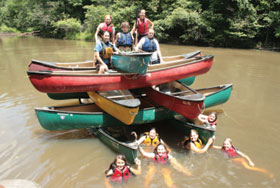Exploring Virtual Education
Online Programs Enhance Classroom Learning
by Daniel Beauregard

In today’s technology-driven world, the definition of what a school is, or can be, is quickly changing. School systems and independent schools are offering new options in addition to the traditional brick-and-mortar school setting. These programs provide an education no less demanding than conventional classrooms for students who travel a great deal, are student athletes or home-schooled, or are simply looking to supplement or speed up their current coursework.
What’s more, online learning can give students more attention than they might receive in the classroom. “In this environment, we are able to personalize instruction and we have a wealth of information about our students,” says Heather Robinson, principal of Georgia Connections Academy, a K-8 virtual school based in Duluth.
A Different Option
 Georgia Connections Academy is a charter school with a statewide attendance zone. The only requirement for admittance is that the student live in Georgia, or reside there most of the time. “We provide our families with the entire school program—we provide the curriculum and hard-copy textbooks to our younger students and e-books for older students,” Robinson says.
Georgia Connections Academy is a charter school with a statewide attendance zone. The only requirement for admittance is that the student live in Georgia, or reside there most of the time. “We provide our families with the entire school program—we provide the curriculum and hard-copy textbooks to our younger students and e-books for older students,” Robinson says.Like any public school, Connections Academy is free. The difference is that students can work from home at their leisure, although they are required to work with a learning coach—usually a parent or guardian—on a daily basis, in addition to working with their teacher.
As with a traditional school, students are required to log attendance hours each day, as well as on an hourly basis, but they can start and end whenever they want, as long as they log the number of hours required. “We have systems in place that collect information about how often a student is logging in, how much time a student is spending on a test or a subject area,” Robinson says.
The only time students are required to be online is when they are scheduled to participate in a live session or meet with their teachers and fellow students in a virtual classroom. All of the teachers work at a teaching center in Duluth and are available by phone or email. “I can’t say that Connections Academy is better than a traditional school,” Robinson says. “I can just say it’s a different option.” Currently, the school has 750 students and its slated to offer high school classes next year. Robinson expects enrollment to grow to about 2,000.
DeKalb County also has a K-12 virtual school, the DeKalb Online Learning Academy. The school works in the same fashion as Connections Academy, but is a branch of the DeKalb County system rather than a statewide charter. Enrollment is $250 per credit course and $50 for out-of-county students.
Another school that functions in a similar way is the Georgia Virtual School, which serves grades 6-12 and is run by the Georgia Department of Education (GDOE). Both Connections and the Virtual School are state-funded.
The Georgia Virtual School uses the approved Georgia Performance Standards and Common Core Georgia Performance Standards curriculum, ensuring that students receive the same education they would in a school setting. Georgia Virtual School currently serves 16,173 students and expects that number to increase by 2,500 for its summer program, which begins in June. Education Director Christina Clayton says the school’s numbers have increased by 22 to 25 percent each year. Decatur High School Assistant Principal Rochelle Lofstrand says her school uses Georgia Virtual School as an enrichment option for its students. “If we don’t offer courses or different levels here at the school, we don’t want that stopping a child in enriching their lives academically,” she says.
According to testing data, Georgia Virtual School students scored nearly 30 percent higher on average than students enrolled in public schools throughout the state. The school’s students come from all types of backgrounds. Currently, 70 percent of its student population is taking a course to supplement their public school curriculum and 17 percent come from a home school environment. The rest are enrolled in private schools, which find Georgia Virtual School on the Internet or by word of mouth.
Some independent schools, however, have developed their own virtual learning programs to meet student demands. Eaton Academy in Roswell, for example, recently developed a virtual learning component for grades 4-12 that branches off from its existing independent study program. Eaton’s virtual learning students complete their work and submit it online, where it is graded by a teacher, says Admissions Coordinator Margie Cohan. Although students have access to their teachers via phone and email, Cohan says there is no virtual classroom component. Students enrolled in the program can take one class, which costs $250, up to a full course load for $1,900. There is also a $250 registration fee.
“A Lot of Flexibility”
 “Our program allows a student to come in at any point in time during the school year and finish it,” Cohan says. “For example, we can take a child who has been out and missed a great deal of school due to illness. The public schools would say he or she had to repeat the entire semester. There’s a lot of flexibility.” Families are interested in the program for a variety of reasons, Cohan says. Some might live out of state, while others might not be interested in a traditional school environment. Students looking to finish high school sooner also use the program.
“Our program allows a student to come in at any point in time during the school year and finish it,” Cohan says. “For example, we can take a child who has been out and missed a great deal of school due to illness. The public schools would say he or she had to repeat the entire semester. There’s a lot of flexibility.” Families are interested in the program for a variety of reasons, Cohan says. Some might live out of state, while others might not be interested in a traditional school environment. Students looking to finish high school sooner also use the program.Virtual learning programs like those provided by Connections Academy and Georgia Virtual Schools, meanwhile, can help students in rural areas get the same coursework as those in more populated regions.
Additionally, if a student excels in a given course and needs a more rigorous curriculum, virtual schools can provide that. “Research is showing that students want a more rigorous and engaging learning environment,” says Clayton of Georgia Virtual Schools.
Ideally, online learning neither supplements classroom learning nor replaces it, she says, but rather offers the best of both worlds. “I believe the best educational experience for a student is when an opportunity is provided for a blended environment—some face-to-face courses and some online,” she says. “However there are cases, like students who are homebound and need to take all of their courses online, that we can provide that option for them to stay on track to graduate.”
CHOOSING A SUMMER CAMP
Finding The Right Fit For Your Child
You shouldn’t wait until school’s out to figure out how your kids will fill their summer days. If sending your child to summer camp is a priority, planning needs to begin now.
Day or Night?
 The first step is to decide between day camp and overnight camp. Be aware that the choice boils down to more than just whether your child comes home every day or spends a week or more away. At day camp, children learn how to get along with others. At a sleepover camp, children learn about their ability to rely on themselves away from home. As a parent, it’s up to you to decide which type of camp is best for your child at this stage in his or her growth.
The first step is to decide between day camp and overnight camp. Be aware that the choice boils down to more than just whether your child comes home every day or spends a week or more away. At day camp, children learn how to get along with others. At a sleepover camp, children learn about their ability to rely on themselves away from home. As a parent, it’s up to you to decide which type of camp is best for your child at this stage in his or her growth.
Gaining an Educational Edge
Camp can be a fun way to help a child get ahead (or catch up) in subjects like algebra, or try their hand at architecture or marine biology. Private schools offer a variety of camps, often open to students who aren’t enrolled during the school year, that offer core curriculum courses or refresher courses.
Pursuing a New Passion
Some camps enable children to pursue specific hobbies or interests. The summer camp at High Meadows School, for example, offers traditional camp activities as well as woodworking and photography. If your child is interested in the fine arts, there are camps that foster performance dance, writing, painting, sculpture or music, as well. Visit www.findacamp.org for more ideas.
With the right prior planning, both you and your children will certainly reap the rewards this summer.
These summer camp tips were provided by High Meadows Summer Day Camp. High Meadows Summer Day Camp in Roswell helps children discover themselves through exciting programs and activities. For more information, call 770-993-7975 or visit www.highmeadowscamp.org
FOR MORE INFORMATION
Georgia Connections Academy
www.connectionsacademy.com
Georgia Virtual School
www.gavirtualschool.org
DeKalb Online Academy
www.dekalbonlineacademy.org
Eaton Academy
www.eatonacademy.org







